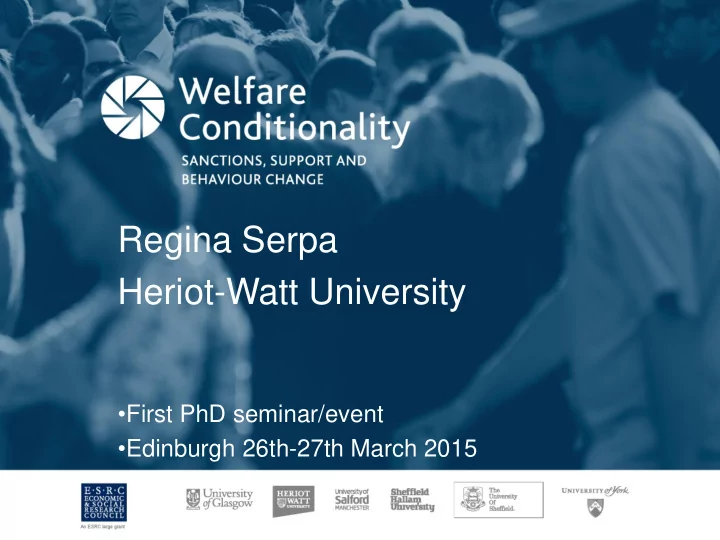

Regina Serpa Heriot-Watt University • First PhD seminar/event • Edinburgh 26th-27th March 2015
Housing strategies of homeless migrants: A comparative study of Central Americans in Massachusetts and Eastern Europeans in Scotland
2 Cases: Migrant homelessness in US and UK ‘Marek’ (Fife Council) ‘ Mimose ’ (AIDS Action) ● Migrated from Poland ● Fled Honduras and for work (not registered trafficked to Florida on WRS) (illegal entrant) ● Lost job and tied ● Condo foreclosed, accommodation exhausted help from ● Homelessness family in Boston application accepted but not eligible for HB ● Shelter homeless to ● left TA to ‘camp’ in park state public housing
Research Question 1: Causation (UK and US) Language Stigma Welfare Support Cultural network Barriers Housing Labour Physical Knowledge and of systems, mental support and health rights Financial Institutional resources Substance racism and and debt dependencies discrimination
Conditionality… the legal bit 1. Immigration control 1. Do you need leave but don’t have it? 2. No recourse to public funds? 3. Temporary admission? 2. Right to reside 1. Are you exercising your treaty rights? 3. Habitual residency 1. In UK ‘appreciable period of time’? 2. Have a ‘settled intention to live in the UK’?
Research Question 2: Housing strategies Limited earnings ● ● Overcrowding No income/ low wages – Informal work/ Illicit – ● Doubled-up means No public assistance ● High housing cost ● Subsidised housing – burden Income supplements – ● Substandard housing Charitable donations ● In-kind benefits/ – ● Foreclosures sponsorship Begging and busking – ● Rough sleeping Personal resources ● ● Emergency shelters Savings and other assets – Friends and family –
'Subsistent’ homelessness: making opportunity when there are few options? ● What degree of choice do people have? ● Are homeless migrants de-prioritising housing? ● Is homelessness a survival strategy? ● What is 'having a home' being sacrificed for? ● 'Subsistence homelessness'- forgoing housing in order to achieve other necessities ● 'Shelter poverty'- forgoing necessities in order to keep a roof over your head
Research Question 3: role of the state ● Human rights: State should intervene to ensure a basic standard of living is protected for all persons regardless of legal status ● Citizenship: Intervention conditional upon meeting social obligations (ie duty to protect dependent on legal status) ● Utilitarian: Minimise costs and maximise benefits in both case number and expenditure ● Paternalism: State should protect people from consequence of poor decision making
Investigating ‘subsistent’ homelessness Methodology Research questions 1. What causes migrant ● Comparative research homelessness? ● Case studies 2. What are the housing ● Key informant interviews strategies of homeless migrants? ● Life story interviews 3. What is the role of the state in responding to migrant homelessness?
Case studies: Central Americans in the US and Eastern Europeans in the UK 1.1m WRS registratio n by 2010 (8% in Scotland) 2000-2012: Central American 2001-2011: Polish population up population up by 72% in by 2,105% in Scotland Massachusetts compared to compared to 890% for UK 30% for US
Interviews and participant observation Edinburgh Scotland Boston Massachusetts National key Policy makers- Policy makers- informants (15) Scottish Government Massachusetts State (2) (2) Voluntary sector (2) Voluntary sector (2) Academics (2) Academics (2) Local informants (15) Local authority (3) City government (3) Voluntary sector (3) Voluntary sector (3) Migrants (30) Literally homeless (7) Literally homeless (7) Precariously housed Precariously housed (7) (7) Total (60) 30 30
The best laid plans…
Recommend
More recommend